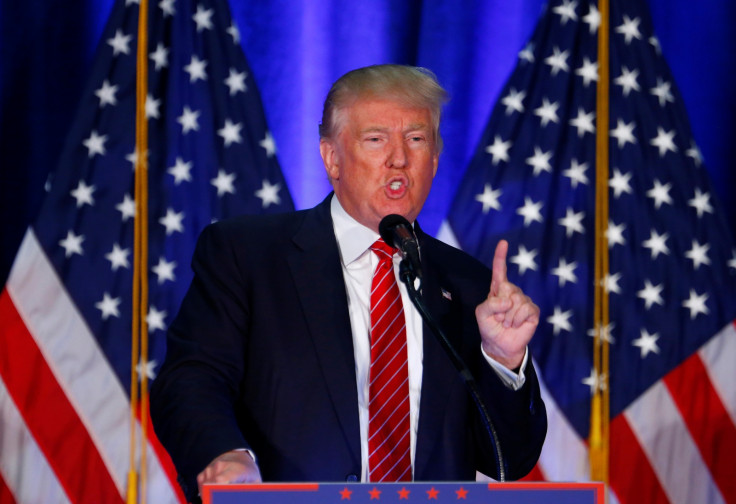Brexit worries and Donald Trump factor driving spike in gold purchases
Demand for physical gold continues to rise despite extreme volatility in the futures market.
If you asked around the City which investment products have excelled for much of 2016, most analysts would tell you that precious metal exchange traded funds (ETFs) currently have a pretty good batting average.
Furthermore, data collated by specialist information provider Morningstar, up to the third quarter of 2016, suggests even the top 10 mutual funds all happen to be precious metals related, and with good reason.
Demand for physical gold – the poster precious metal for safe haven investors – continues to rise despite extreme volatility in the futures market. Hardly any central bank appears to be in gold divestment mode.
The average investor has been pretty jittery of late – we've had a Brexit vote, several European countries such as Italy and Spain are in political turmoil, Donald Trump has shaken up the US political landscape regardless of whether or not he gets into the White House, and the global economy continues to stutter.
Such factors have led to the current unprecedented demand for physical gold, according to Josh Saul, chief executive officer of The Pure Gold Company, a bullion trader.
"For the first time in decades, we are calling on gold in the ground in incremental volumes. Physical gold is in finite supply, and not many are selling. On the contrary, for first 10 months of the year, we have seen a 39% rise in purchases on an annualised basis. There are people who have never purchased physical gold before, but now feel inclined to do so, worried about the future."
As good as gold?
Over the past few months, City observers, including commentators at Panmure Gordon, TD Direct and Wilson King Investment Management, have told IBTimes UK that allocating more than 10-15% of one's investment portfolio to gold, with a short-term investment mindset, would not be advisable as the yellow metal offers no yield and behaves more like an insurance hedge.

Saul does not dispute the conjecture of money managers, but adds: "Income is important in a less volatile investing climate. People are more than happy to indulge in capital preservation in such trying times as the one we find ourselves in."
For purposes of research, IBTimes UK contacted selected physical gold purchasers* lined up by The Pure Gold Company to find out their motivation for plying into the gold market and their expectations going forward.
Sally from Southampton says loss of faith in other investing avenues has driven her to physical gold. "I feel very uneasy about the current macroeconomic climate and fear there is much manipulation of the markets and economies on a global scale. Gold is perhaps not immune to market manipulation, but gold is gold and I feel is far more stable than "paper money", so I would rather have long and medium term savings in physical gold than anything else."
Laura and Simon, a couple from Chigwell, say an erosion of their trust in paper savings has driven them to explore buying more physical gold. "The political climate is unsettled in many countries, not just in the UK. A lack of income growth and a rise in inequality have opened the door for populist, inward-looking policies.
"We feel, now more than ever, that policymakers will find it even harder to tackle legacy problems and further expose economies and markets to shocks. Our big concern is the threat of a Bank 'Bail-in'; whereby a financial institution on the brink of failure is rescued by making its creditors and depositors take a loss on their holdings."
Of course, banking compensation schemes exist in the UK and elsewhere should a financial institution collapse, but for many like Laura and Simon, memories of the aftermath of the Northern Rock crisis are pretty raw. Cash, it would appear, is not longer king, especially with some ISAs offering as little as 0.01% interest.
Even precious metal futures market commentators seem to agree that the pull of physical gold is likely to get further entrenched. FXTM's chief market strategist Hussein Sayed says investors reckon that after Brexit anything is possible, including the not so far-fetched idea of a Donald Trump US presidency.
Towards the end of 2015, the Comex gold futures contract had dropped 40% from its 2011 all-time high of $1,920 an ounce. Yet, as the end of 2016 approaches, the contract is up by over 20% swinging either side of $1,300 an ounce, despite the near imminent prospect of a US interest rate hike, conventionally deemed as a damper for gold.
"Gold is trying to hold above $1,300 after recovering 5% from 7 October lows. I continue to favour the yellow metal over the short to medium-term with a lot of uncertainty surrounding the current investment environment," Sayed says.
Overseas investors stocking up in gold town
Furthermore, overseas investors are increasingly plying into the London bullion market. Anecdotal and empirical evidence suggests investors from Russia and China who have had their money sitting the UK, exposed to currency risk and property market fluctuations, are turning sterling holdings into gold, deeming the latter to be less volatile.
It is here that London bullion market's storage business has come into its own. A weaker sterling has meant cost of buying and subsequently storing gold with British bullion traders has suddenly become more attractive.

Most service providers charge between 0.65% and 1.15% of the overall value per annum, billing for no more than 3-6 months' worth of storage at a time. Even the Royal Mint offers storage, albeit at a premium to conventional bullion market players.
Typically, the gold is fully insured, stored and secured with a London Bullion Market Association member, and audited internally and externally. Investors are offered a choice of pooled storage, ie share of a physical gold bar with others, or fully segregated storage, ie separated from others' gold holdings and held in the customer's own vault. Should customers demand access to physical holdings, it is typically arranged, and often delivered within 24 hours of the request being made.
Saul of The Pure Gold Company says: "We keep prices attractive because we don't want clients' price appreciation eaten into, or the storage burden to be too high should there be a downside. We use Loomis International and all gold is audited internally and externally by Grant Thornton.
"Storage, while not a huge part of our business, is rising in recent months. There is growing market evidence of investors from Greece, Portugal, Spain and Italy, opting for gold purchases but wanting to stock the holdings overseas."
In a domestic context, Saul says, motivation of consumers for storing gold with bullion service providers are very different. "Safety is one reason; as buyers living in areas with high crime rates avoid storing at home. Furthermore, keeping gold at home raises the contents insurance premium. Customers in urban areas are more likely to have their gold stored.
"Our own research suggests, female customers and couples are more likely to avail the storage option, as opposed to men."
With most providers offering easy access to the gold, the storage uptick looks set to continue. However, more holistically speaking both futures and physical gold market commentators say the yellow metal has a lot going for it, and safe haven demand will not subside once the result of the US presidential election is known.
From the Italian referendum to Greece's economic woes, triggering or not of the Article 50 by the British government to China's economic slowdown, there will still be plenty of reasons driving spooked investors to the safety hedge that gold offers.
*The aforementioned gold purchasers' broader details have been held back by IBTimes UK to protect their identity.
© Copyright IBTimes 2025. All rights reserved.






















